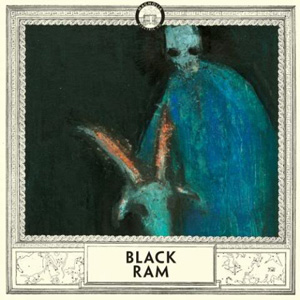Magnolia Electric Co., "Black Ram"
 In 2005, when Camper Van Beethoven’s gear was stolen on tour, Jason Molina ran into David Lowery and offered to lend him some of Magnolia Electric Co.'s equipment. They became friends and, later that year, met in Richmond, Virginia to record some new songs Jason had in the works. Before he could finish, Molina’s mother suffered a stroke. He completed what he could and returned in 2006 to finish Black Ram, one of the four recordings that finally surfaced as part of 2007’s Sojourner boxed set. Backed by musicians not in the touring Magnolia lineup, it's one of the darkest and most distinct albums Molina ever released—closer to his Songs: Ohia days in spirit and tone, and overflowing with some of his best writing.
In 2005, when Camper Van Beethoven’s gear was stolen on tour, Jason Molina ran into David Lowery and offered to lend him some of Magnolia Electric Co.'s equipment. They became friends and, later that year, met in Richmond, Virginia to record some new songs Jason had in the works. Before he could finish, Molina’s mother suffered a stroke. He completed what he could and returned in 2006 to finish Black Ram, one of the four recordings that finally surfaced as part of 2007’s Sojourner boxed set. Backed by musicians not in the touring Magnolia lineup, it's one of the darkest and most distinct albums Molina ever released—closer to his Songs: Ohia days in spirit and tone, and overflowing with some of his best writing.
Secretly Canadian and Magnolia Electric Co. had a difficult choice to make in 2006. I'm still not sure they made the right one. Jason Molina and company had recorded three albums and two EPs worth of new music in about the span of a year. Faced with so much music, Secretly Canadian inexplicably froze up. Much of what was recorded would appear on the Sojourner box a year later, but at the time they felt they couldn't release everything at once. Instead, they put out a Jason Molina solo record, assembled Fading Trails from songs found on each of the four Sojourner CDs, and quickly followed everything up with a tour.
I still like Fading Trails, but after hearing Black Ram for the first time, I couldn't understand why it wasn't released instead. Had it not been tucked away in an intimidating box set of all new recordings, it might have received the attention it deserves, being one of Molina's best albums. Maybe Jason wanted to focus on the touring Magnolia band instead, or maybe Secretly Canadian planned on releasing Black Ram later. Either way, it half disappeared into the monolith of Sojourner and the fruits of Molina's tireless work ethic. Let Me Go, Let Me Go, Let Me Go kept me occupied for a long time, and before I could absorb everything on Sojourner, Josephine was on the way with the Molina and Johnson record not far behind.
A couple interviews in 2006 hinted at how special Black Ram was to Jason. In a Q&A on the official Magnolia site, he listed it among his best albums, calling it a concept record about a ghost. In a Chicago Reader interview from that same year he referred to it as "high-impact" and strongly emotional. There's no doubt it's a haunted record. That clue about the ghost concept won't solve any of Jason's many lyrical puzzles, but it does clarify his mindset. Lyrically, Black Ram is populated with images of death, dark riders, and an ancient landscape populated by mysterious and dangerous spirits.
It opens with "In the Human World," invoking the "mountains of the dead" and a despair that is better heard than described. It follows with "Black Ram," a song built up from apocalyptic dream images and magic rituals, and from glimpses of ghostly worlds that reside just at the edge of perception. There’s a lot of remembering and yearning, and ruthless self examination that admits guilt and holds on to hope and forgiveness with the same trembling breath—just listen to "What’s Broken Becomes Better" or "Kanawha"; Jason fits it all into tightly written, tersely performed four minute songs that hit as hard as anything on Didn’t It Rain or Magnolia Electric Co.
The subject matter gets so heavy and personal that the album sounds like a journey through the underworld in places, especially on the title track and "Will-o-the-Wisp," two of its most intense songs. Two of Jason's best from Fading Trails—"A Little at a Time" and "The Old Horizon"—are here too, sounding better and more natural alongside their proper brethren, which were all recorded with Miguel Urbiztondo behind the drums and on Harmonium, with David Lowery on bass, and with Alan Weatherhead responsible for guitar, pedal steel, Mellotron, and engineering duties. Filmmaker Rick Alverson, Andrew Bird, and the mysterious Molly Blackbird also lend a hand.
Musically, the band follows Jason’s lyrical lead. The instrumentation shifts from thick and soupy to sparse and skeletal depending on the song, but is always held together by the rhythm section. David Lowery’s bass swells and shakes on every song, providing shades of black and purple color for the guitars to shine against. Miguel Urbiztondo’s drumming pushes the music forward on one or two songs, but otherwise unfolds patiently, not keeping time so much as marking its passing. Even on the more rock oriented material, he keeps things smoky and indistinct, preferring tension and texture to a driving beat. The Mellotron and Harmonium help in that department too. I notice them most when they’re used to create a surface on which the melodies can skate. There is something almost creepy about the sounds the Mellotron makes, as if it were playing back samples from EVP sessions, or broadcasting noise from outer space.
Despite the slow pace and the dark themes, Black Ram uses contrast extremely well, making the darks darker and the light colors that much brighter. Melodically, the album is carried by Jason’s voice and just a few lead instruments. When guitars do take the lead, they do so in a big way. "What’s Broken Becomes Better" has an eviscerating electric solo that cuts so hard it turns the song around, giving it a hopeful finale. "A Little At a Time" also puts a guitar solo front and center, using it to add color and deliver the song’s dramatic climax. But, most of all, I hear and feel the weight of the rhythm section, murky and hot, and the pull of Jason’s singing. When he intones "goodbye, my love / goodbye" on "Will-o-the-Wisp" I can almost see the scene he’s painting; and when "The Old Horizon" finally hits, it chills to the bone—the feeling of isolation and being lost comes on strong, and Jason's use of piano and bowed percussion only amplify that loneliness.
With such strong musical performances, great songs, and such potent lyrical references, Black Ram accumulates a very believable and almost magical atmosphere. Deciphering all the allusions and personal references is probably impossible, but unnecessary anyway. Each time it ends, I leave the album thinking that all the places and spirits Jason mentions are real, that they're not just fanciful representations of personal thoughts, and that I might be able to hear them too if I listen hard enough.
So when the album starts and Jason asks "mountains of the dead are you listening?" I wonder if he is talking to me.
samples:
 



